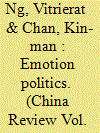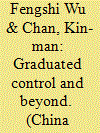| Srl | Item |
| 1 |
ID:
151408


|
|
|
|
|
| Summary/Abstract |
This study explores the role of emotion in political mobilization by
studying People Power, a radical group in Hong Kong. Th e group abandoned
their disruptive approach and adopted a new tactic of social
movement—joyous resistance—which attracted large numbers of participants
and thus became a powerful political force exerting great pressure
on the government. Th is case shows that festive emotion can be an intangible
resource that reduces the cost of participation compared with
confrontational tactics. Th e cathartic function of joyous resistance also
reduces the potential for violence during mobilization. After the
Umbrella Movement, there has been debate on whether more confrontational
or even violent tactics should be adopted in social movements.
Th e idea of joyous resistance will remain an important option for social
movement organizers considering the sustainability of mobilization in a
moderate society such as Hong Kong.
|
|
|
|
|
|
|
|
|
|
|
|
|
|
|
|
| 2 |
ID:
118674


|
|
|
|
|
| Publication |
2012.
|
| Summary/Abstract |
Despite recent policy changes, governmental monitoring and control of grassroots NGOs remain pervasive and effective to a large extent in China. The enforcement of control over NGOs is complicated by at least three layers of factors: First, multiple agencies are involved in NGO control without a centralised norm. Second, government-NGO interactions vary across cases and are deeply rooted in local political contexts. Last, but not least, since the NGO community at its origin is highly diverse, NGOs' responses to various types of governmental control differ, which in turn triggers further complications. The main findings of this research are based on interviews with 60 NGO staff, as well as with civil affairs officials in Shanghai and Shenzhen from January 2011 to May 2012.
|
|
|
|
|
|
|
|
|
|
|
|
|
|
|
|
| 3 |
ID:
130439


|
|
|
|
|
| Publication |
2014.
|
| Summary/Abstract |
In the past two decades, the number of grass-roots NGOs in China has grown dramatically, yet most scholarship on Chinese civil society has had little to say about the resources on which they rely for survival. This article presents the first large-scale study of these groups and their resources. We compare 263 NGOs across issue areas (including HIV, education, the environment and labor rights) and regions (Beijing, Guangdong and Yunnan). We find that these groups are tapping into high levels of human resources-volunteers, boards of directors and informal government ties-even without official government approval for their activities. We also detail their sources of funding, revealing a diverse support system with clear regional and issue-based biases. Taken together, our findings form a baseline for understanding China's grass-roots NGOs and point out new research questions that have yet to be addressed in the civil society literature.
|
|
|
|
|
|
|
|
|
|
|
|
|
|
|
|